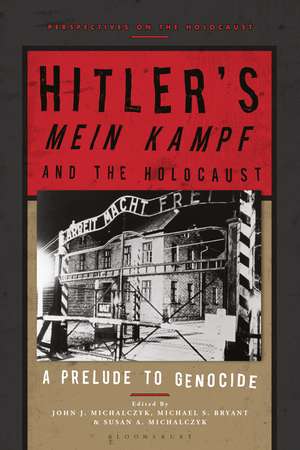Hitler’s ‘Mein Kampf’ and the Holocaust: A Prelude to Genocide: Perspectives on the Holocaust
Editat de Professor John J. Michalczyk, Professor Michael S. Bryant, Dr Susan A. Michalczyken Limba Engleză Paperback – 9 mar 2022
| Toate formatele și edițiile | Preț | Express |
|---|---|---|
| Paperback (1) | 150.94 lei 22-36 zile | +24.30 lei 5-11 zile |
| Bloomsbury Publishing – 9 mar 2022 | 150.94 lei 22-36 zile | +24.30 lei 5-11 zile |
| Hardback (1) | 410.71 lei 43-57 zile | |
| Bloomsbury Publishing – 9 mar 2022 | 410.71 lei 43-57 zile |
Preț: 150.94 lei
Nou
Puncte Express: 226
Preț estimativ în valută:
28.88€ • 30.23$ • 24.04£
28.88€ • 30.23$ • 24.04£
Carte disponibilă
Livrare economică 10-24 martie
Livrare express 21-27 februarie pentru 34.29 lei
Preluare comenzi: 021 569.72.76
Specificații
ISBN-13: 9781350185449
ISBN-10: 1350185442
Pagini: 368
Ilustrații: 21 bw illus
Dimensiuni: 156 x 234 x 23 mm
Greutate: 0.59 kg
Editura: Bloomsbury Publishing
Colecția Bloomsbury Academic
Seria Perspectives on the Holocaust
Locul publicării:London, United Kingdom
ISBN-10: 1350185442
Pagini: 368
Ilustrații: 21 bw illus
Dimensiuni: 156 x 234 x 23 mm
Greutate: 0.59 kg
Editura: Bloomsbury Publishing
Colecția Bloomsbury Academic
Seria Perspectives on the Holocaust
Locul publicării:London, United Kingdom
Caracteristici
Impressive contributor cast of world-renowned scholars, such as Magnus Brechtken, Susannah Heschel and Nathan Stoltzfus
Notă biografică
John J. Michalczyk is Professor and Director of Film Studies at Boston College, USA. He is the author of Filming the End of the Holocaust (Bloomsbury, 2014). He is also the editor of Medicine, Ethics, and the Third Reich: Historical and Contemporary Issues (1994), Resisters, Rescuers, and Refugees: Historical and Ethical Issues (1997) and, with SJ Raymond G. Helmick, Through a Lens Darkly: Films of Genocide and Ethnic Cleansing (2013).Michael S. Bryant is Professor of History and Legal Studies at Bryant University, USA. He is the author of A World History of War Crimes (Bloomsbury, 2021), Confronting the "Good Death:" Nazi Euthanasia on Trial, 1945-53 (2005) and Eyewitness to Genocide: Jewish Witnesses, West German Courts, and the "Operation Reinhard" Trials, 1956-1966 (2014).Susan A. Michalczyk is Associate Professor of the Practice at Boston College, USA.
Cuprins
List of FiguresContributorsAcknowledgementsForeword, Timothy Ryback Introduction Part I. The Mise en scène of Mein Kampf, 1924-20161. Focus Landsberg: A Bavarian Town and its History Tied to Hitler, Karla Schoenebeck (Independent Scholar, Germany)2. Mein Kampf: Part of the Right-Winged German Post-War Literature, Othmar Ploeckinger (Brandeis University, USA)3. Mein Kampf: The Critical Edition in Historical Perspective, Magnus Brechtken (Institute of Contemporary History, Germany) Part II. Maintaining Power4. Hitler, Leadership and The Holocaust, Paul Bookbinder (University of Massachusetts Boston, USA)5. Violence in Mein Kampf: Tactic and Political Communication, Nathan Stoltzfus (Florida State University, USA) and Ryan Stackhouse (Independent Scholar, USA)Part III. Eugenics and Aesthetics in Mein Kampf6. Blood, Race and the Holocaust, John J. Michalczyk (Boston College, USA)7. Degeneracy: Attack on Modern Art and Music, Ralf Yusuf Gawlick (Boston College, USA) and Barbara S. Gawlick (Boston College, USA)Part IV. Mein Kampf and the Crusade against Germany's 'Enemies'8. The Auroras of the Final Solution: Intimations of Genocide in Mein Kampf, Michael Bryant (Bryant University, USA)9. Pathway to the Shoah: The Protocols, 'Jewish Bolshevism', Rosenberg, Goebbels, Ford, and Hitler, David Crowe (Chapman University, USA)10. Marxism: Enemy of the People in the Political Party and Military System, Melanie Murphy (Emmanuel College, USA)11. Being Adolf Hitler: Mein Kampf as Anti-Semitic Bildungsroman, Susannah Heschel (Dartmouth College, USA)Part V. Religious Overtones in Mein Kampf12. Mein Kampf: Catholic Authority and the Holocaust, Martin Menke (Rivier University, USA)13. The Apocalypse of Adolf Hitler: Mein Kampf and the Eschatological Origins of the Holocaust, David Redles (Cuyahoga Community College, USA)Part VI. Epilogue14. Holocaust Education and (Early) Signs of the Erosion of Democracy, Tetyana Kloubert (Catholic University of Eichstaett-Ingolstadt, Germany)AppendicesNotesBibliographyIndex
Recenzii
With in-depth studies of Mein Kampf as a genre (an anti-Semitic Bildungsroman), analyses of its context, esthetics, and its religious overtones, this collection of essays illuminates the most lethal and darkest of books. The close readings of Hitler's language of crusade against the enemy and of his prophetic and apocalyptic discourse show how his breviary of hate led to the Holocaust, and how rhetorical violence can become a pathway to mass murder.
Hitler's Mein Kampf and the Holocaust is a very important anthology about one of the most influential books in modern world history, written by Adolf Hitler in 1923/24 during his imprisonment in the small Bavarian town of Landsberg am Lech. After its first appearance in 1925 it was destined to unfold its fatal effect as an ideological manifest of National Socialism. The anthology sheds light on key aspects of the complex history of the impact of Mein Kampf and represents a standard work on this subject.
Hitler's Mein Kampf and the Holocaust is a very important anthology about one of the most influential books in modern world history, written by Adolf Hitler in 1923/24 during his imprisonment in the small Bavarian town of Landsberg am Lech. After its first appearance in 1925 it was destined to unfold its fatal effect as an ideological manifest of National Socialism. The anthology sheds light on key aspects of the complex history of the impact of Mein Kampf and represents a standard work on this subject.









